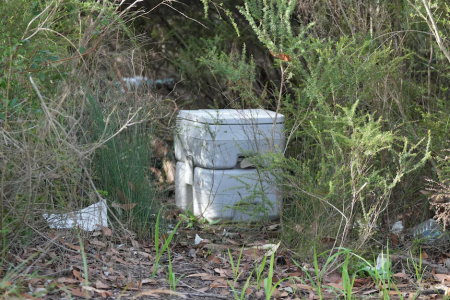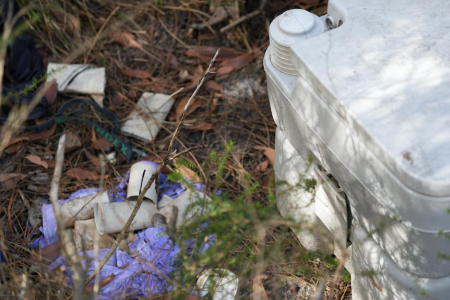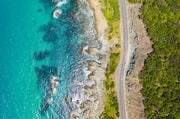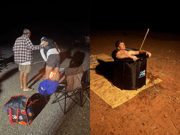Illegal campers leave 'unbelievable mess' on southern WA highway
By
ABC News
- Replies 0
Authorities along Western Australia's south coast are warning of serious financial penalties for roadside dumping after campers left piles of razors, rubbish and an excrement-filled toilet by a highway.
A rest stop between the popular tourist towns of Albany and Denmark, about 420 kilometres south of Perth, was left in disarray after the Easter and Anzac Day long weekends.
Both communities swell with tourists on holidays and long weekends, infuriating some residents.
Last year, locals in the Shire of Denmark erected a sign attempting to dissuade holiday-makers staying at a popular tourist town, while last month the City of Albany implemented a hardline response, fining illegal campers.
The moves appear to have pushed some campers away from the towns and into rest areas with fewer amenities.
Those who regularly used rest stops, like WA truck driver Glenn "Yogi" Kendall, said the situation highlighted declining etiquette and courtesy among some road users.
"The long and short of it is horrible," he said.
"If we pull up at night and we're trying to cook a feed in a barbecue and get stuff out, you're just walking around people's filth because they are just trash," he said.
"No-one's got a shovel anymore, no-one goes into the scrub base … it's disgusting."
"It's disgusting that people dump stuff," he said.
"It frustrates the crap out of us that people dump their household rubbish in somewhere I've got to stay overnight."
"I don't think so, logically you'd say yes, but when we had an issue at the waterfront at Christmas time and we moved people on, they just simply moved," he said.
"When you've got TikTok and WikiCamps where people share information really quickly in that network they'll just go somewhere else that's not being policed."
Mr Stocks said people who chose to stay overnight at the rest stops were doing so illegally but rangers had no authority to police the location managed by Main Roads.
"It's really clear in the Caravan and Camping Grounds Act [from] 1995, you can't park in parks or you can't camp in public lands, beaches, parks or rest stops," he said.
"But that doesn't stop people from doing it. Compliance is the issue in all of this."
"Fines are applicable for illegal dumping, and they're fairly significant fines, up to $62,000 for individuals or $125,000 for businesses," he said.
Mr Duffield said there was a measurable correlation between illegal dumping and busy holiday periods, but also pointed out that much of the dumping included items from local residents.
"People are using those areas as an opportunity to dump household rubbish," he said.
"They're [dumping] beds, washing machines, tyres, oil, asbestos, even from time to time household waste."
He said overnight camping or dumping in the rest areas that prevented drivers from using them for their intended purpose could have a flow-on effect to other road users.
A rest stop between the popular tourist towns of Albany and Denmark, about 420 kilometres south of Perth, was left in disarray after the Easter and Anzac Day long weekends.
Both communities swell with tourists on holidays and long weekends, infuriating some residents.
Last year, locals in the Shire of Denmark erected a sign attempting to dissuade holiday-makers staying at a popular tourist town, while last month the City of Albany implemented a hardline response, fining illegal campers.
The moves appear to have pushed some campers away from the towns and into rest areas with fewer amenities.
Those who regularly used rest stops, like WA truck driver Glenn "Yogi" Kendall, said the situation highlighted declining etiquette and courtesy among some road users.
"The long and short of it is horrible," he said.
"If we pull up at night and we're trying to cook a feed in a barbecue and get stuff out, you're just walking around people's filth because they are just trash," he said.
Mr Kendall said the problem had "skyrocketed" across the country with people dumping at rest stops instead of paying for campsites or tip permits."It's disgusting that people dump stuff," he said.
"It frustrates the crap out of us that people dump their household rubbish in somewhere I've got to stay overnight."
Mayor blames TikTok
Albany Mayor Greg Stocks said he did not believe the city's policy of handing out fines and moving on campers had contributed to the problem."I don't think so, logically you'd say yes, but when we had an issue at the waterfront at Christmas time and we moved people on, they just simply moved," he said.
"When you've got TikTok and WikiCamps where people share information really quickly in that network they'll just go somewhere else that's not being policed."
Mr Stocks said people who chose to stay overnight at the rest stops were doing so illegally but rangers had no authority to police the location managed by Main Roads.
"It's really clear in the Caravan and Camping Grounds Act [from] 1995, you can't park in parks or you can't camp in public lands, beaches, parks or rest stops," he said.
"But that doesn't stop people from doing it. Compliance is the issue in all of this."
Dumpers face hefty fines
Main Roads's Great Southern regional director Andrew Duffield said the department was trying to address the issue."Fines are applicable for illegal dumping, and they're fairly significant fines, up to $62,000 for individuals or $125,000 for businesses," he said.
Mr Duffield said there was a measurable correlation between illegal dumping and busy holiday periods, but also pointed out that much of the dumping included items from local residents.
"People are using those areas as an opportunity to dump household rubbish," he said.
"They're [dumping] beds, washing machines, tyres, oil, asbestos, even from time to time household waste."
He said overnight camping or dumping in the rest areas that prevented drivers from using them for their intended purpose could have a flow-on effect to other road users.









